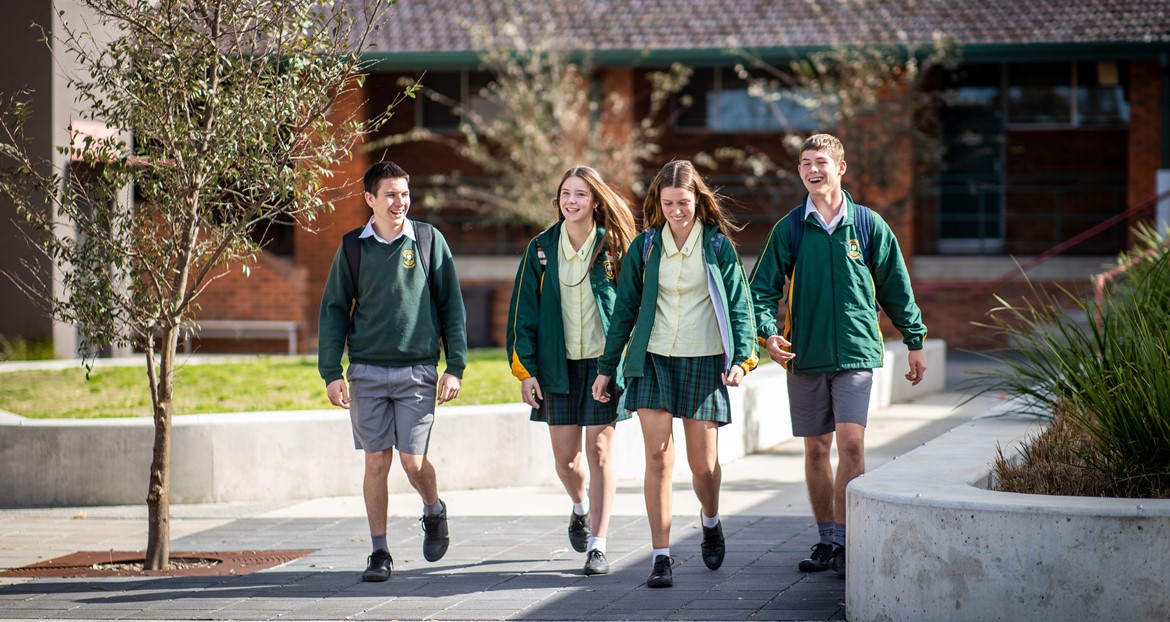A whole school approach to student wellbeing promotes respectful teaching and learning communities where students feel safe, supported and included. Wellbeing and learning are inextricably linked. Wellbeing is integral to school engagement and successful learning and successful learning is a key contributor to positive lifelong wellbeing outcomes. The Alice Springs (Mparntwe) Education Declaration states that “Education plays a vital role in promoting the intellectual, physical, social, emotional, moral, spiritual and aesthetic development and wellbeing of young Australians, …" Our Catholic schools are committed to ensuring that every student is nurtured and supported to achieve their potential.
The Catholic Schools Office has developed a Student Wellbeing and Pastoral Care Policy (2021) and related Framework which guides policies, programs, resources and practices implemented at both a system and school level, to support and enhance the wellbeing of students within the school community.
Click here to access our Wellbeing Framework, Wellbeing Together - Student Wellbeing and Learning Across the Whole School.
Student wellbeing within our Catholic schools emphasises the importance of:
- our Catholic faith, pastoral care and student voice guiding and informing our student wellbeing approach
- a safe, supportive and inclusive school environment
- opportunities for students to be creative, connected and engaged
- student learning, leading and thriving.
The Catholic, identity and mission of our schools is to develop the whole child, ensuring that their spiritual, social, emotional, cognitive and physical needs are met to ensure lifelong learning and wellbeing. Wellbeing is dependent upon, and nurtured through positive, authentic relationships of care and support. Relationships within our catholic schools value the dignity of the person, promoting connection, safety, trust and respect for all within a faith-filled community.
Our Catholic school communities take proactive whole-school approaches to developing and/or implementing effective wellbeing practices and policies including those for student safety, mental health and pastoral care. Wellbeing is optimised when students feel safe and supported, are connected to their school communities and engaged in their learning.
Some of the wellbeing initiatives that are being utilised in our Catholic schools include:
- Student Wellbeing and Pastoral Care Policy
- Student Wellbeing Framework - “Wellbeing Together – Student wellbeing and learning across the whole school”
- Positive Behaviour for Learning – a framework that ensures a consistent school-wide positive approach to behaviour support
- Social and Emotional Learning - programs and practices that assist students to develop self-awareness, self-management, relationship skills, responsible decision-making and social awareness
- Youth Mental Health First Aid – Professional learning for staff
- Australian Student Wellbeing Framework – a framework and resources for schools which promotes a whole-school approach to fostering student wellbeing
- Be You – a framework and resources for schools that encourages positive mental health and wellbeing
- Wellbeing Week – where fun, health promotion activities are planned for students and staff
- Healthy Children Initiative (HCI) - is a primary school program which includes Crunch&Sip® and Live, Life, Well @ School (LLWatS) and the NSW Healthy School Canteen Strategy. Schools have an important role in developing and supporting children's healthy eating and physical activity habits.
Health, wellbeing and relationships are taught in primary and secondary schools in the diocese as part of Personal Development, Health and Physical Education (PDHPE) programs from Kindergarten to Year 12. The PDHPE syllabus provides a strengths-based approach to develop knowledge and skills so that students enhance their own health, safety and wellbeing. This program incorporates drug education, safety, mental health and wellbeing, sexuality and sexual health, as well as food and nutrition and physical activity.
COUNSELLING SERVICES
Each school in the Maitland Newcastle Diocese has access to a school counsellor. School Counsellors have qualifications in psychology, social work or counselling and are registered with their professional associations. School counsellors have expertise in:
- child and adolescent development including mental health assessments and interventions;
- learning and cognitive assessment and interventions;
- knowledge and skills in behavioural assessments and interventions.
School counsellors work within a multi-tiered system of support and can deliver individual and group interventions as well as delivering mental health literacy education and prevention programs for whole school communities. School counsellors have clear professional and ethical guidelines and are committed to providing confidential and evidence-based service to schools with the wellbeing of the child at the heart of the service.
The school counselling team is supported by a Senior Counsellor and a Coordinator based at the CSO, who also provide support and consultation to all school executive and wellbeing staff on matters relating to student mental health and critical incidents.


